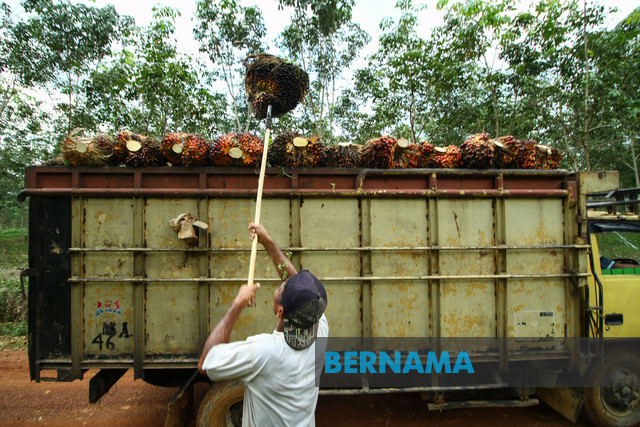News
Mahathir defends palm oil in UN address
By MUIN ABDUL MAJID
NEW YORK, Sept 28 (Bernama) -- Tun Dr Mahathir Mohamad has highlighted Malaysia's objection over attempts to ban the import of palm oil at the United Nations (UN), saying it is a classic case of the denial of free trade.
Speaking at the General Debate of the 74th Session of the UN General Assembly here Friday, the Malaysian prime minister made his case against such move, stating that palm oil was still a big contributor to the country's economy.
"There is no evidence that it is poisonous. We appeal to the good sense of the rich not to impoverish us, not to deprive hundreds of thousands of our workers from earning a living. You will be doing a good deed by consuming palm oil," he said as he alluded to the ban on the import of palm oil proposed by the European countries.
Dr Mahathir reckoned that due to inability to sustain the competitiveness of their own edible oils, a campaign was mounted to ban palm oil, with claims that palm oil is poisonous to health, destroy the habitat of long-nosed monkeys, reduce carbon dioxide absorption and so on.
Underscoring that Malaysia was as concerned about the environment as the Europeans, the prime minister pointed out that the country’s forest cover currently stood at 55.3 per cent, exceeding the pledge it made at the Rio Earth Summit in 1992 to maintain at least 50 per cent of landmass under forest cover.

Turning to trade wars, he said they were wasteful and would stultify the potential for everyone to become rich.
Taking aim at sanctions being levelled against certain countries, Dr Mahathir said it was not known under what law such sanctions were applied.
"It appears to be the privilege of the rich and the powerful. If we want to have sanctions, let us have a law to govern them.
"The fact is that when sanction is applied to a country, other countries get sanctioned as well. Malaysia and many others lost a big market when sanction is applied on Iran," the prime minister said.
All countries of the world he believed, wished to prosper and should be allowed to develop by their own but were hampered from doing so.
Despite much talk about free trade, he said, new regulations were being introduced all the time which were detrimental to the development of poor countries.
"This is because proposals on rules and regulations are made by the rich, often secretly. The poor are practically forced to accept them," he said, citing the example of the Trans-Pacific Partnership.
"It was cooked up in Washington with inputs from their big businesses. In the agreement, governments of small countries could be forced to compensate the big foreign companies with huge sums of money, should their decision affect the profitability of the big companies, including future profit," he said.
Fortunately, Dr Mahathir said, the powerful country which prepared these agreements had rejected it.
"With the exclusion of this country, the agreement has become more palatable. But the agreement still laid down conditions for trade – which negates free trade. We are told that we must remove duties on imports, or reduce it so that foreign products can knock out our infant industries.
"We are reduced to exporting only raw material. How do we industrialise and create jobs for our people?" he said.
Dr Mahathir said he believed in capitalism but capitalism had gone mad.
"They are already talking of making trillions. It's dangerous for a person or a company to have so much money. It can influence things. It can buy power. Hence the anti-trust laws. We see in the Trans-Pacific Partnership – TPP when the rich companies had given themselves the power to sue governments.
"The terms of the agreements were drawn up by them. And they are not all like Bill Gates. Most are bent on exploiting the power money gives them," he said.
-- BERNAMA
Other News
Sarawak Lepasi Sasaran Kapasiti Gabungan Tenaga Boleh Baharu Tahun Ini - Abang Johari

Oleh Nur Ashikin Abdul Aziz
SINGAPURA, 21 Okt (Bernama) -- Sarawak mencapai 62 peratus sasaran campuran kapasiti tenaga boleh baharu (TBB) tahun ini, melepasi sasaran 60 peratus yang digariskan dalam Strategi Pembangunan Pasca COVID-19 (PCDS) 2030.
Sarawak Pacu Pertumbuhan Tenaga Boleh Diperbaharui Untuk Manfaat ASEAN - Premier

SINGAPURA, 21 Okt (Bernama) -- Sarawak komited menyokong peralihan tenaga boleh diperbaharui di Asia Tenggara dengan memanfaatkan potensinya sebagai "Bateri ASEAN," yang akan membekalkan tenaga bersih menerusi sambungan Grid Kuasa Borneo dan ASEAN.
Belanjawan 2025 Percepat Peralihan Kepada Tenaga Bersih - Solarvest

KUALA LUMPUR, 19 Okt (Bernama) -- Belanjawan 2025 merupakan satu langkah ke arah mempercepat peralihan kepada tenaga bersih di Malaysia, kata Solarvest Holdings Bhd.
© 2025 BERNAMA. All Rights Reserved.
Disclaimer | Privacy Policy | Security Policy This material may not be published, broadcast,
rewritten or redistributed in any form except with the prior written permission of BERNAMA.
Contact us :
General [ +603-2693 9933, helpdesk@bernama.com ]
Product/Service Enquiries [ +603-2050 4466, digitalsales@bernama.com ]
